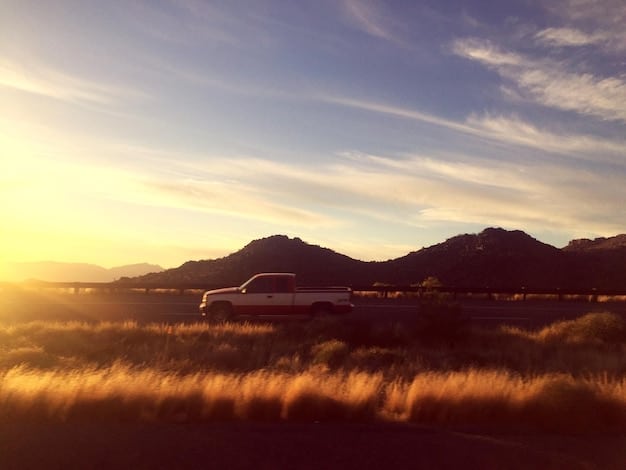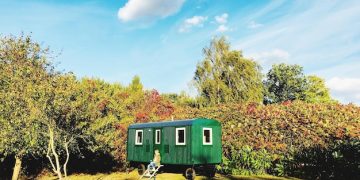Van Life in the US 2025: Freedom, Community & Challenges

Van life in the US in 2025 represents a vibrant subculture offering freedom and community, but faces challenges such as rising costs, limited resources, and the need for sustainable practices amidst increasing popularity.
The allure of the open road, the promise of minimalist living, and the desire for a strong sense of community are driving forces behind the **van life** movement in the US. As we move into 2025, it’s essential to explore the unique blend of freedom, community, and challenges that define this nomadic lifestyle.
The Rise of Van Life in America
Van life has experienced a significant surge in popularity in the United States over the past decade. This trend reflects broader societal shifts, including a growing interest in alternative lifestyles, environmental consciousness, and a desire for greater autonomy. Social media platforms have played a crucial role in showcasing the appeal of van life through curated images and inspiring narratives.
Factors Contributing to the Growth
Several factors have coalesced to fuel the expansion of van life. The increasing cost of traditional housing, coupled with stagnant wages, has made the prospect of a mobile, lower-cost living option more attractive to many. The rise of remote work has also enabled more people to pursue location-independent careers, making van life a viable and appealing choice.
Social Media’s Influence
Platforms like Instagram and YouTube have been instrumental in shaping perceptions of van life. Influencers and content creators share their experiences, offering tips, hacks, and showcasing the aesthetic appeal of their customized vans. This digital visibility has not only attracted new followers but also created a supportive online community for van dwellers.
- Increased visibility through social media platforms.
- Growing desire for minimalist and sustainable lifestyles.
- The appeal of location independence and remote work opportunities.
Ultimately, the allure of van life in America stems from the promise of freedom and adventure, tempered by the realities of community and sustainability. This subculture continues to evolve, shaped by individual experiences and the changing landscape of American society.
The Allure of Freedom on Four Wheels
One of the primary motivations for embracing van life is the unparalleled freedom it offers. Living in a van allows individuals to break free from the constraints of traditional housing and explore the vast landscapes of the United States. This freedom extends beyond physical mobility; it also encompasses financial independence and the ability to design a life tailored to personal values.

Exploring the Open Road
Van life opens up opportunities for spontaneous travel and adventure. Van dwellers can wake up to stunning sunrises in national parks, camp along picturesque coastlines, and immerse themselves in diverse cultural experiences. This constant exploration fosters a sense of freedom and discovery that is hard to replicate in a stationary lifestyle.
Financial Flexibility
Downsizing and transitioning to van life can significantly reduce living expenses. By eliminating rent or mortgage payments, van dwellers can allocate their resources towards travel, personal development, or savings. This financial flexibility empowers individuals to pursue their passions and create a life that aligns with their priorities.
- Freedom to travel and explore diverse landscapes.
- Opportunity for financial independence through reduced living expenses.
- Ability to customize living space and lifestyle to personal preferences.
For many, the allure of freedom on four wheels is a powerful incentive to embrace van life, creating a lifestyle that prioritizes experiences, personal growth, and a deep connection with the natural world.
Building Community on the Road
Despite its inherently nomadic nature, van life fosters a strong sense of community among its practitioners. This community is built on shared experiences, mutual support, and a common desire for connection. Van dwellers often seek out opportunities to meet and interact with fellow nomads, both online and in person.
Online Networks and Forums
Online platforms such as Facebook groups, Reddit forums, and dedicated van life websites provide spaces for individuals to connect, share information, and offer support. These virtual communities facilitate the exchange of tips, advice, and encouragement, fostering a sense of belonging despite the physical distance separating van dwellers.
In-Person Gatherings and Meetups
Van life meetups and organized gatherings are common occurrences in popular travel destinations. These events provide opportunities for van dwellers to meet face-to-face, share stories, and build lasting friendships. Such gatherings often include workshops, skill-sharing sessions, and communal meals, strengthening the bonds within the community.

- Strong social connections built through online platforms and forums.
- Opportunities for in-person gatherings and meetups in popular travel destinations.
- Shared values and experiences that foster a sense of community among nomads.
The van life community is characterized by its inclusivity, supportiveness, and willingness to help one another. This sense of belonging provides emotional resilience and a valuable network of resources for individuals navigating the challenges of life on the road.
Navigating the Challenges of Nomadic Living
While van life offers numerous benefits, it also presents a unique set of challenges that require careful consideration and proactive planning. These challenges range from logistical issues such as finding safe parking and accessing essential resources to emotional and social adjustments associated with a nomadic lifestyle.
Logistical Hurdles
One of the primary challenges of van life is securing safe and legal parking. Many cities and towns have restrictions on overnight parking, making it difficult for van dwellers to find suitable places to sleep. Additionally, accessing essential resources such as water, electricity, and waste disposal can be challenging, particularly in remote areas.
Safety and Security
Personal safety is a paramount concern for van dwellers. Choosing safe campsites, taking precautions against theft, and maintaining a reliable communication system are essential for mitigating risks. It’s important to be aware of potential dangers and to develop strategies for responding to emergencies.
- Securing safe and legal overnight parking
- Accessing essential resources like water, electricity and waste disposal
- Maintaining personal safety and security on the road
Successfully navigating the challenges of nomadic living requires a combination of resourcefulness, adaptability, and a commitment to personal well-being. By addressing these challenges proactively, van dwellers can enhance their overall quality of life and enjoy the freedom and adventure that van life offers.
Sustainability and Environmental Impact
As the van life movement grows, there is increasing awareness of its environmental impact. Van dwellers are becoming more conscious of their ecological footprint and are exploring ways to minimize their impact on the environment. This section examines the sustainability challenges associated with van life and highlights practices that promote environmental responsibility.
Minimizing Waste and Resource Consumption
Reducing waste and conserving resources is a key aspect of sustainable van life. This includes practices such as using reusable containers, minimizing water consumption, and properly disposing of waste. Composting toilets and greywater systems can further reduce environmental impact.
Energy Efficiency and Renewable Resources
Transitioning to renewable energy sources is another important step towards sustainability. Solar panels can provide a reliable source of electricity for powering appliances and charging devices. Efficient appliances and LED lighting can further reduce energy consumption.
- Reducing waste through reusable containers and proper waste disposal.
- Conserving water through efficient usage and greywater systems.
- Employing solar panels and efficient appliances to reduce energy consumption.
Promoting sustainability in van life requires a commitment to environmental responsibility and a continuous effort to adopt eco-friendly practices. By minimizing their environmental impact, van dwellers can help preserve the natural beauty of the landscapes they explore and contribute to a more sustainable future.
The Future of Van Life in the US: Trends to Watch
As we look ahead to 2025 and beyond, several trends are likely to shape the future of van life in the US. These trends reflect evolving social values, technological advancements, and a growing awareness of the challenges and opportunities associated with nomadic living.
Increased Regulation and Zoning Restrictions
The growing popularity of van life is likely to result in increased regulation and zoning restrictions. Cities and towns may implement stricter rules regarding overnight parking and camping in public spaces. Van dwellers will need to be proactive in advocating for their rights and working with local authorities to find sustainable solutions.
Technological Innovations
Technological advancements will continue to enhance the van life experience. Innovations in areas such as solar power, battery technology, and connectivity will provide greater convenience and self-sufficiency for van dwellers. Smart home technology and mobile apps will further streamline the management of essential resources and logistics.
Greater Focus on Inclusivity and Diversity
The van life community is becoming more diverse, with individuals from various backgrounds and identities embracing the nomadic lifestyle. There is a growing emphasis on inclusivity and creating welcoming spaces for people of all races, genders, and sexual orientations. This commitment to diversity will strengthen the community and enrich the shared experience of van life.
- Potential for increased regulation and zoning restrictions on van dwelling.
- Advancements in solar power, battery technology, and connectivity enhancing the van life experience.
- Greater focus on inclusivity and diversity within the van life community.
The future of van life in the US is dynamic and multifaceted. By adapting to evolving trends, embracing technological innovations, and fostering a culture of inclusivity, the van life community can continue to thrive and offer a unique and fulfilling lifestyle for those seeking freedom, community, and adventure.
| Key Point | Brief Description |
|---|---|
| 🚐 Freedom | Van life offers unparalleled freedom to explore, travel, and live life on your own terms. |
| 🤝 Community | A strong sense of community is fostered through online networks and in-person gatherings. |
| 💰 Cost | Challenges include managing costs, especially with rising fuel and camping fees. |
| 🌱 Sustainability | Focusing on minimizing environmental impact through eco-friendly practices. |
Frequently Asked Questions
▼
The main benefits include freedom to travel, lower living costs, and a strong sense of community. Van life allows you to explore new places and simplify your lifestyle.
▼
Use apps like iOverlander and Freecampsites.net to find safe and legal camping spots. Always read reviews and check local regulations beforehand.
▼
Essentials include a portable power station, water storage, cooking equipment, and a comfortable bed. Organize your space efficiently for a better living experience.
▼
Many van dwellers work remotely as freelancers, digital nomads, or seasonal workers. Having a reliable internet connection is essential for staying employed.
▼
Expect challenges such as limited space, occasional maintenance issues, and the need to adapt to varying climates and regulations. Careful planning can mitigate these issues.
Conclusion
In conclusion, van life in the US in 2025 represents a dynamic and evolving subculture that offers both unparalleled freedom and significant challenges. As the movement grows, it’s essential to address issues of sustainability, regulation, and inclusivity to ensure a vibrant and responsible future for van dwellers.





